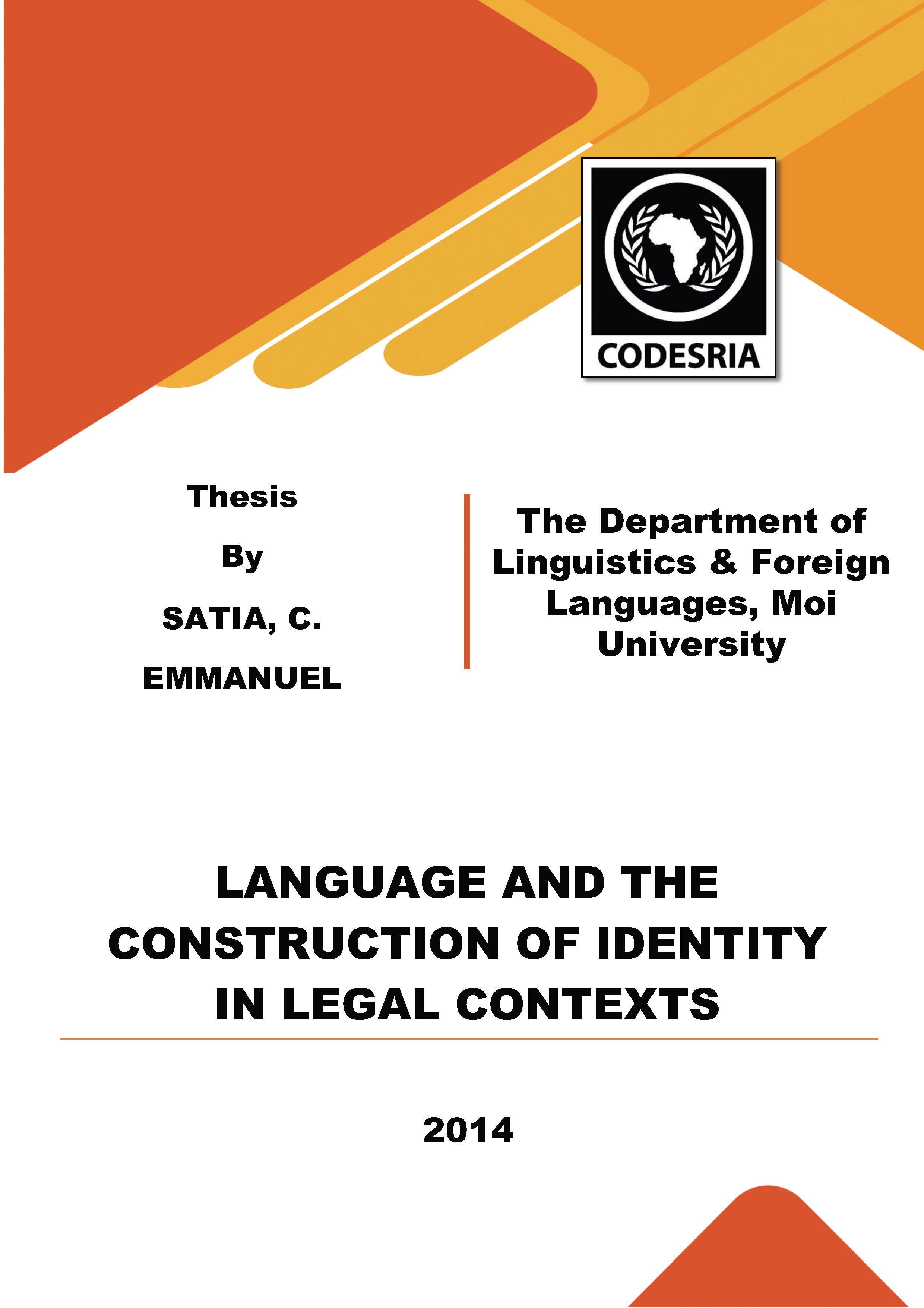LANGUAGE AND THE CONSTRUCTION OF IDENTITY IN LEGAL CONTEXTS
Keywords:
LANGUAGE, IDENTITY, LEGAL CONTEXTSSynopsis
This study sought to investigate how language is used in the construction of identity in legal contexts. The main objective of the study was to analyze the language used in legal contexts, show how such language aided in the construction of identity and finally, to explain the nature of identities so constructed. Using a qualitative research design, the author collected samples of courtroom proceedings, police statements and prison letters and analyzed them within Norman Fairclough's approach to Critical Discourse Analysis and the Corpus Linguistics method. The corpus linguistics analyses were supported by WordSmith Software Version 5. Accordingly, the data were analyzed at three levels namely, grammatical level, lexical level and lastly, at the stylistic level. The study found that there is a close interface between language and identity. At the grammatical level, it was found that interactants in the selected legal contexts constructed their own identities or the identities of their interlocutors by manipulating a variety of strategies which included agency, modality, and intertextuality. At the lexical level, this study found that identities were constructed through strategic lexical choices and the use of euphemisms. At the stylistic level, the study found that identities were constructed through idiosyncratic pronunciations, choice of resister and careful selections of vocatives among others.But beyond linguistic findings, this study also found that identities were constructedthrough knowledge displays and that when the identities of the interactants were damaged, the affected persons resorted to using image repair strategies such as denial, shifting blame and giving a positive description of self. Among the main identities that were constructed included a professional identity, victim identity and criminal identity. This study concludes that language, the specific social context and the kind of legal system in a jurisdiction affect the construction of identity.
Downloads
References
Moeketsi, Rosemary. (2002). Understanding the Other: A Case of Mis-Interpreting Culture-Specific Utterances during Alternative Dispute Resolution. In: Cotterill, Janet (ed.). Language in the Legal Process. Houndmills: Palgrave Macmillan, 196-210.
Misra, R. P. (1988). Research Methodology. New Delhi: Concept Publishing Company.
Mulholland, J. (1994 ). Handbook of Persuasive Tactics. London: Routledge.
Mullany, Louise. (2007). Gendered Discourse in Professional Workplace. London: Palgrave Macmillan.
Mullany, Louise. (2006). Narrative Constructions of Gender and Professional Identities. In: Omoniyi Tope & Goodith White (Eds.). The Sociolinguistics of Identity. London: Continuum.
Nakane, Ikuko. (2007). Silence in Intercultural Communication: Perceptions and Performance. Amsterdam: John Benjamins Publishing Company.
Namakula, Catherine S. (2012). Language Rights in the Minimum Guarantees of Fair Criminal Trial. International Journal of Speech language and the Law. 19 (1), 73 - 93.
Newbury, Phillip & Alison Johnson. (2006). Suspects' Resistance to Constraining and Coercive Questioning Strategies in the Police Interview. International Journal of Speech, Language and the Law. 13 (2), 213-240.
Ngugi, Thiong'o. (1981). Detained. Nairobi: East African Educational Publishers.
Oakes, Leigh & Jane Warren. (2007). Language, Citizenship and Identity in Quebec. Houndsmill: Palgrave Macmillan.
O'Connor, Patricia E. (2000). Speaking of Crime: Narratives of Prisoners. Lincoln: University of Nebraska Press.
O'Connor, Patricia E. (1995). Speaking of Crime: "I don't Know What Made Me Do It". Discourse Society 1995 6 (3), 429-456.
O'Connor, Patricia E. (1994). 'You Could Feel it through the Skin: Agency and Positioning in Prisoners' Stabbing Stories'. Text 14 (1), 45 - 75.
Ochs, Elinor. (2000). Transcription as Theory. In: Jaworski, A. & Nicolas Coupland. The Discourse Reader. London: Routledge, 167-182.
Ochs, Elinor. (1992). Indexing Gender. In: Duranti Alessandro and Charles Goodwin (Eds). Rethinking Context: Language as an Interactive Phenomenon. Cambridge: Cambridge University Press.






